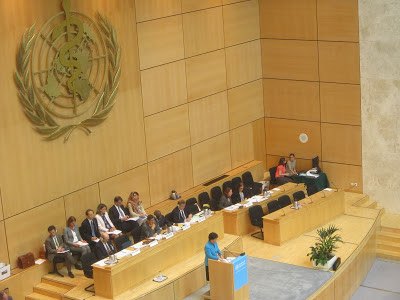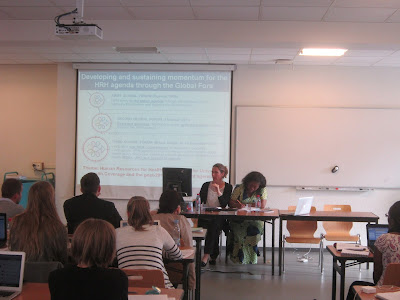Policy brief: Post 2015
The International Federation of Medical Students’ Associations is the international representative body of the 1.3 million medical students of the world as well as being a voice for the youth.
The development of the post 2015 agenda has thus far involved a broad, open consultative process with a variety of stakeholders including the youth. The youth appreciate the encouraged involvement of young people in this process thus far and urge the UN, WHO and member states to continue promoting the participation of the youth. Young people are the future and engaging them in the consultation, planning and implementation of the post 2015 agenda will promote young people claiming and investing in this future
Key principles
1. In the formulation of the post 2015 agenda, the principles of equity, sustainability, universality and the maintenance of momentum from the past MDG framework must be remembered.
• We think it is vital that we learn from the past and ensure that goals are created in a manner which are upheld by a variety of underlying values and principles.
o Progress has occurred but in most instances it has been inequitable. Equity should not form a singular goal but rather underpin each area in the post 2015 agenda and be specified
o Goals, strategies and implemented initiatives must be created in a manner that is sustainable and intersects with the sustainable development goals
o There needs to be a shift away from vertically oriented programs to horizontal, reflecting to initial aspirations of the Alma Ata conference and the need for maintaining the framework of goals that are global
o It is important that new agendas are not created to the detriment of old ones. Many of the MDGs are yet to be achieved and we must maintain momentum through creating goals that smoothly transition and involve the old MDG framework within the new
2. The role of health across multiple sectors must be considered in order to create sustainable human development
• We urge the consideration of health and the impacts that other thematic areas of the planned post-2015 agenda have on its attainment. Furthermore, beyond the concepts of development, health should be considered in all policies to reflect the multi-sectoral, cross cutting nature of global health.
3. The consideration of the unique obstacles young people face in achieving health and hence implementing strategies to tackle these through involvement of the youth in consultation, planning and implementation.
• We support the universality of goals in the new development agenda but emphasise the importance of highlighting at risk populations like adolescents. Young people face a number of unique health issues including sexual reproductive health, mental health, nutrition as well as issues affecting their ability to attain health such as forced/early marriage, homelessness, alcohol and tobacco and access to education
The International Federation of Medical Students’ Associations is the international representative body of the 1.3 million medical students of the world as well as being a voice for the youth.
The development of the post 2015 agenda has thus far involved a broad, open consultative process with a variety of stakeholders including the youth. The youth appreciate the encouraged involvement of young people in this process thus far and urge the UN, WHO and member states to continue promoting the participation of the youth. Young people are the future and engaging them in the consultation, planning and implementation of the post 2015 agenda will promote young people claiming and investing in this future
Key principles
1. In the formulation of the post 2015 agenda, the principles of equity, sustainability, universality and the maintenance of momentum from the past MDG framework must be remembered.
• We think it is vital that we learn from the past and ensure that goals are created in a manner which are upheld by a variety of underlying values and principles.
o Progress has occurred but in most instances it has been inequitable. Equity should not form a singular goal but rather underpin each area in the post 2015 agenda and be specified
o Goals, strategies and implemented initiatives must be created in a manner that is sustainable and intersects with the sustainable development goals
o There needs to be a shift away from vertically oriented programs to horizontal, reflecting to initial aspirations of the Alma Ata conference and the need for maintaining the framework of goals that are global
o It is important that new agendas are not created to the detriment of old ones. Many of the MDGs are yet to be achieved and we must maintain momentum through creating goals that smoothly transition and involve the old MDG framework within the new
2. The role of health across multiple sectors must be considered in order to create sustainable human development
• We urge the consideration of health and the impacts that other thematic areas of the planned post-2015 agenda have on its attainment. Furthermore, beyond the concepts of development, health should be considered in all policies to reflect the multi-sectoral, cross cutting nature of global health.
3. The consideration of the unique obstacles young people face in achieving health and hence implementing strategies to tackle these through involvement of the youth in consultation, planning and implementation.
• We support the universality of goals in the new development agenda but emphasise the importance of highlighting at risk populations like adolescents. Young people face a number of unique health issues including sexual reproductive health, mental health, nutrition as well as issues affecting their ability to attain health such as forced/early marriage, homelessness, alcohol and tobacco and access to education











